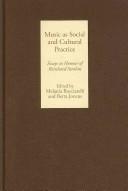| Listing 1 - 3 of 3 |
Sort by
|

ISBN: 1282185721 9786612185724 1846155770 1843833174 Year: 2023 Publisher: Woodbridge : The Boydell Press,
Abstract | Keywords | Export | Availability | Bookmark
 Loading...
Loading...Choose an application
- Reference Manager
- EndNote
- RefWorks (Direct export to RefWorks)
The linking theme of the essays collected here is the intersection of musical work with social and cultural practice. Inspired by Professor Strohm's ideas, as is fitting in a volume in his honour, leading scholars in the field explore diverse conceptualisations of the 'work' within the contexts of a specific repertory, over four main sections. Music in Theory and Practice studies the link between treatises and musical practice, and analyses how historicalwritings can reveal period views on the 'work' in music before 1800. Art and Social Process: Music in Court and Urban Societies looks at the social and cultural practices informing composition from the late Renaissance until the mid-eighteenth century, and interrogates current notions of canon formation and the exchange between local and foreign traditions.
Music --- Social aspects. --- History and criticism. --- Strohm, Reinhard. --- Criticism --- Music and society --- European music. --- artistic autonomy. --- genre. --- historical writings. --- music work. --- musical treatises. --- nineteenth-century music. --- social and cultural practice. --- Philosophy and aesthetics.
Multi
ISBN: 9781783270651 1783270659 9781782047667 1782047662 Year: 2016 Publisher: Woodbridge The Boydell Press
Abstract | Keywords | Export | Availability | Bookmark
 Loading...
Loading...Choose an application
- Reference Manager
- EndNote
- RefWorks (Direct export to RefWorks)
Art and money, culture and commerce, have long been seen as uncomfortable bedfellows. Indeed, the connections between them have tended to resist full investigation, particularly in the musical sphere. The Idea of Art Music in a Commercial World, 1800-1930, is a collection of essays that present fresh insights into the ways in which art music, i.e., classical music, functioned beyond its newly established aesthetic purpose (art for art's sake) and intersected with commercial agendas in nineteenth- and early twentieth-century culture. Understanding how art music was portrayed and perceived in a modernizing marketplace, and how culture and commerce interacted, are the book's main goals. In this volume, international scholars from musicology and other disciplines address a rangeof unexplored topics, including the relationship of sacred music with commerce in the mid nineteenth century, the role of music in urban cultural development in the early twentieth, and the marketingof musical repertories, performers and instruments across time and place, to investigate what happened once art music began to be understood as needing to exist within the wider framework of commercially oriented culture. Historical case studies present contrasting topics and themes that not only vary geographically and ideologically but also overlap in significant ways, pushing back the boundaries of the 'music as commerce' discussion. Through diverse, multidisciplinary approaches, the volume opens up significant paths for conversation about how musical concepts, practices and products wereshaped by interrelationships between culture and commerce. CHRISTINA BASHFORD is Associate Professor of Musicology at the University of Illinois. ROBERTA MONTEMORRA MARVIN is Director of the Opera Studies Forum in the Obermann Center for Advanced Studies at the University of Iowa, where she is also on the faculty. CONTRIBUTORS: Christina Bashford, George Biddlecombe, Denise Gallo, David Gramit, Catherine Hennessy Wolter, Roberta Montemorra Marvin, Fiona Palmer, Jann Pasler, Michela Ronzani, Jon Solomon, Jeffrey S. Sposato, Nicholas Vazsonyi, David Wright
Music --- Musicians --- Musique --- Musiciens --- Economic aspects --- Marketing --- Economic conditions --- Aspect économique --- Conditions économiques --- sociologie --- economie --- marketing --- muziekgeschiedenis --- Economics --- anno 1800-1899 --- Social aspects --- History --- Art music --- Art music, Western --- Classical music --- Musical compositions --- Musical works --- Serious music --- Western art music --- Western music (Western countries) --- World War I. --- art and music history. --- art history. --- capitalism. --- commercialism. --- cultural studies. --- interdisciplinary musicology. --- music and culture. --- musicology. --- nineteenth century music. --- popularity. --- twentieth century music.
Book
ISBN: 1787448843 178744967X 1580469655 Year: 2020 Publisher: Rochester, NY : University of Rochester Press,
Abstract | Keywords | Export | Availability | Bookmark
 Loading...
Loading...Choose an application
- Reference Manager
- EndNote
- RefWorks (Direct export to RefWorks)
Examines the history of musical self-quotation, and reveals and explores a previously unidentified case of Schubert quoting one of his own songs in a major instrumental work.
Quotation in music. --- Borrowing (Music) --- Musical borrowing --- Music --- Schubert, Franz, --- Schubert, Franz --- Schubert, Franz Peter, --- Shu-po-tʻe, --- Shubert, F. --- Shubert, Frant︠s︡, --- Šubertas, F. (Francas), --- Šubertas, Francas Peteris, --- שוברט, פרנץ --- Criticism and interpretation. --- Schubert, Franz ; 1797-1828 ; Ellens Gesang ; D. 839. --- Schubert, Franz ; 1797-1828 ; Trios ; D. 929 ; piano, violin, cello ; E♭ major. --- Schubert, Franz ; 1797-1828 ; Criticism and interpretation. --- Austrian history. --- Beethoven. --- Lieder. --- Music history. --- Schumann. --- composer. --- dedication. --- intertextuality. --- nineteenth-century music. --- reuse.
| Listing 1 - 3 of 3 |
Sort by
|

 Search
Search Feedback
Feedback About UniCat
About UniCat  Help
Help News
News